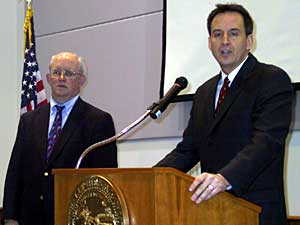Photos
More from MPR
Resources
Your Voice
| ||||||||||||||||||||||||||||||||||||||||||||||||||
Pawlenty's bonding package totals $760 million
January 14, 2004
 |
| Finance Commissioner Dan McElroy (left) and Gov. Tim Pawlenty discuss the $760 million in bonding proposals they are recommending to the Legislature. (MPR Photo/Laura McCallum) |
St. Paul, Minn. — Even-year legislative sessions are typically referred to as bonding sessions. The Legislature traditionally sets the two-year state budget in the odd-numbered years, and usually passes a package of public works projects in the even years. It's commonly called the bonding bill because the vast majority of projects are funded with money borrowed through bond sales.
In Gov. Pawlenty's proposal, $689 million worth of project bonds would be backed by general state revenues. The rest would come from other types of bonds and cash. Pawlenty says his proposal is higher than some House Republicans would like, and lower than Senate Democrats will likely propose.
"We thought we'd just save everybody the drama and the charade, and look at a bill that would be in between those two likely goalposts to begin with," Pawlenty says.
 | |||
Pawlenty has spent the last week and a half highlighting some of the projects in the bill, from the Northstar commuter rail line between Minneapolis and Big Lake to money for the Minnesota Zoo.
Pawlenty also wants $25 million for the Redevelopment Grant Program that includes $10 million in grants to help local governments with the redevelopment of brownfields and new development, and $15 million for bioscience development.
Also included is $20 million for a University of Minnesota and Mayo Clinic joint bioscience research facility and $4.7 million to the Historical Society for the revitalization of Fort Snelling.
In total, the governor's bonding package focuses on five areas: -$195.6 million for education.
-$194.0 million for economic development, housing and transportation.
-$172.4 million for environment and natural resources.
-$108.4 million for corrections and sexual predators.
-$89.3 million for effective government and public services.
Pawlenty noted that 60 percent of the funds are earmarked for greater Minnesota.
The biggest single project in the bill is a nearly $75 million expansion of the medium-security prison in Faribault. Deputy Corrections Commissioner Dennis Benson says the expansion would add 701 new prison beds.
"The space crunch in the department is very critical. In fact, we're at a point where we have about 60 beds left in the entire system," says Benson. "We're at a point where we have to start double-bunking at Stillwater and St. Cloud, which we're concerned about."
|
Last session, it was all or nothing (with Pawlenty) ... It's going to be different this time. We got a chaplain who will lead us in prayer and we got a general who will lead us into battle.
- Sen. Keith Langseth, referring to Senate DFL leader Dean Johnson |
Benson says Corrections considered privatization, but says state officials don't want to privatize medium-security prisons. The bill also includes about $19 million for a 150-bed segregation unit at the Stillwater prison.
Higher education would get about $165 million, including nearly $77 million for the University of Minnesota. The money at the U would go for building removation and upkeep.
The U's chief financial officer, Richard Pfutzenreuter, says university officials are very disappointed with the governor's proposal, because it funds less than half of the university's building requests.
"He severely cut our asset preservation -- you know, the money that we use to fix roofs, to remodel classrooms for students," says Pfutzenreuter. "We had a request of $90 million, he gave us $38 million. He also cut out a very important project in the Academic Health Center for medical students."
The governor's proposal recommends nearly $89 million for the MnSCU system - less than half of the MnSCU requests. Sen. Keith Langseth, DFL-Glyndon, chair of the Senate Capital Investment Committee, says higher education appears to be low on Pawlenty's priority list compared to other projects.
"It really surprised me that he was quite generous in so many of those areas. Then it come to higher ed, then he just played Scrooge," says Langseth.
Langseth says the Senate bonding bill will likely fund nearly all of the higher education requests. He says the Senate package will be closer to $890 million. At that size, the bill would keep the state's debt payments under 3 percent of the state budget. That's a guideline the Legislature has historically used to cap bond payments. But Governor Pawlenty says he doesn't want a bill any higher than his proposal.
"This is a ceiling, it's not a floor," says Pawlenty.
The governor's line in the sand prompted an angry response from Langseth.
"Last session, it was all or nothing, and he was going to shut down state government if he didn't get everything he wanted," Langseth says. "It's going to be different this time. We got a chaplain who will lead us in prayer and we got a general who will lead us into battle."
Langseth is referring to newly-elected Senate Majority Leader Dean Johnson, a Lutheran minister and brigadier general in the National Guard.
While Democrats will be pushing for a bigger bonding bill, House Republican leaders want a skinnier one. House Capital Investment Committee chairman Phil Krinkie, R-Shoreview, said a day earlier that Pawlenty's proposal needed to go on an Atkins diet. He says some House Republicans will object to certain projects such as Northstar, and says his proposal will be closer to $500 million.
|
News Headlines
|
Related Subjects
|

